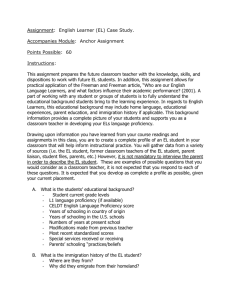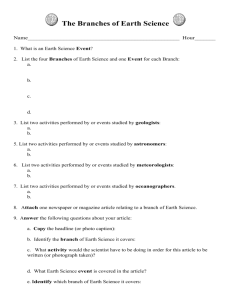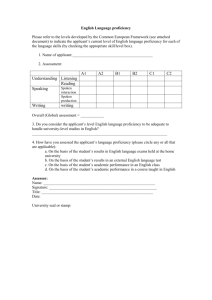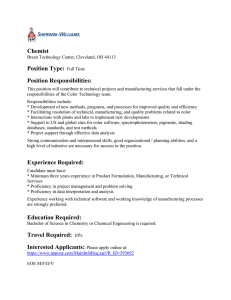University Studies Advisory Committee Review. 2015-16 Foundations Category: Foreign Language Foreign Language
advertisement
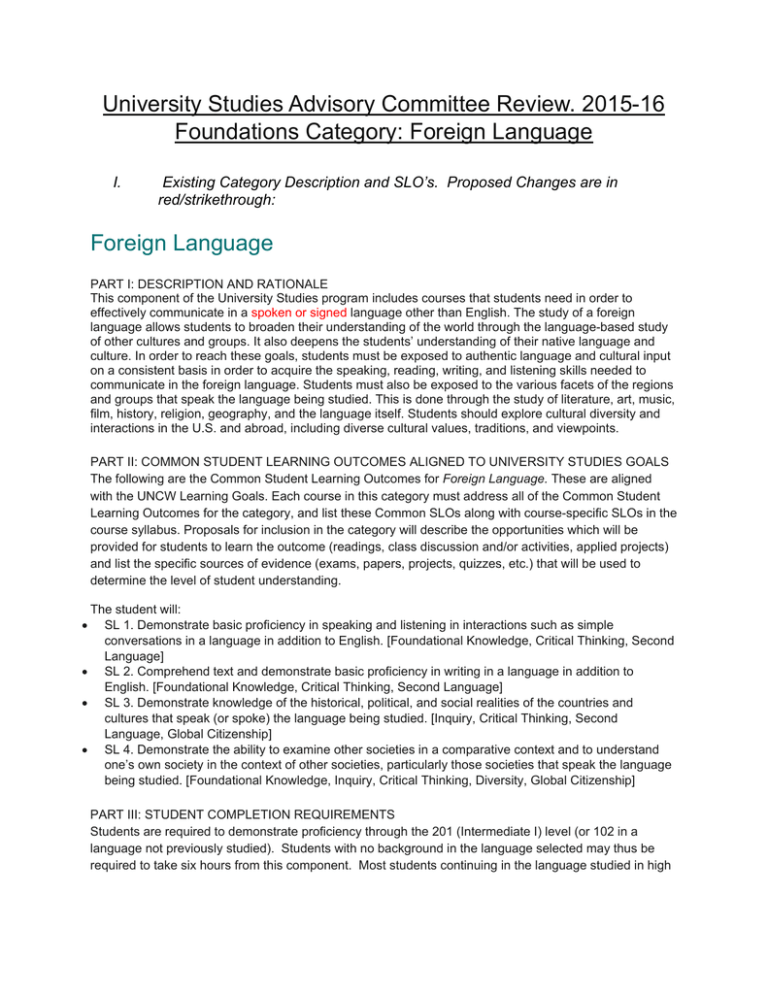
University Studies Advisory Committee Review. 2015-16 Foundations Category: Foreign Language I. Existing Category Description and SLO’s. Proposed Changes are in red/strikethrough: Foreign Language PART I: DESCRIPTION AND RATIONALE This component of the University Studies program includes courses that students need in order to effectively communicate in a spoken or signed language other than English. The study of a foreign language allows students to broaden their understanding of the world through the language-based study of other cultures and groups. It also deepens the students’ understanding of their native language and culture. In order to reach these goals, students must be exposed to authentic language and cultural input on a consistent basis in order to acquire the speaking, reading, writing, and listening skills needed to communicate in the foreign language. Students must also be exposed to the various facets of the regions and groups that speak the language being studied. This is done through the study of literature, art, music, film, history, religion, geography, and the language itself. Students should explore cultural diversity and interactions in the U.S. and abroad, including diverse cultural values, traditions, and viewpoints. PART II: COMMON STUDENT LEARNING OUTCOMES ALIGNED TO UNIVERSITY STUDIES GOALS The following are the Common Student Learning Outcomes for Foreign Language. These are aligned with the UNCW Learning Goals. Each course in this category must address all of the Common Student Learning Outcomes for the category, and list these Common SLOs along with course-specific SLOs in the course syllabus. Proposals for inclusion in the category will describe the opportunities which will be provided for students to learn the outcome (readings, class discussion and/or activities, applied projects) and list the specific sources of evidence (exams, papers, projects, quizzes, etc.) that will be used to determine the level of student understanding. The student will: SL 1. Demonstrate basic proficiency in speaking and listening in interactions such as simple conversations in a language in addition to English. [Foundational Knowledge, Critical Thinking, Second Language] SL 2. Comprehend text and demonstrate basic proficiency in writing in a language in addition to English. [Foundational Knowledge, Critical Thinking, Second Language] SL 3. Demonstrate knowledge of the historical, political, and social realities of the countries and cultures that speak (or spoke) the language being studied. [Inquiry, Critical Thinking, Second Language, Global Citizenship] SL 4. Demonstrate the ability to examine other societies in a comparative context and to understand one’s own society in the context of other societies, particularly those societies that speak the language being studied. [Foundational Knowledge, Inquiry, Critical Thinking, Diversity, Global Citizenship] PART III: STUDENT COMPLETION REQUIREMENTS Students are required to demonstrate proficiency through the 201 (Intermediate I) level (or 102 in a language not previously studied). Students with no background in the language selected may thus be required to take six hours from this component. Most students continuing in the language studied in high school will likely take 0-3 hours from this component. Students with sufficient background may elect to fulfill this requirement by examination. II. Category Specific Guidelines for Proposers—Foreign Language 1) Proposed courses should articulate how SLO 3 and 4 will relate to specific assignments and course activities. 2) Proposed courses MUST be related to spoken or signed languages as opposed to technical or professionally relevant communication. III. Category Specific Suggested/Possible Strategic/Waiver Modifications 1) USAC urges FLL to work with the office of undergraduate studies and advisors in clarifying waiver procedures. We encourage FLL to work to streamline options for students who place out of 201 to consider the requirement complete without additional coursework. 2) Proposed waivers MUST be related to proficiency in spoken or signed languages as opposed to technical or professionally relevant communication.
